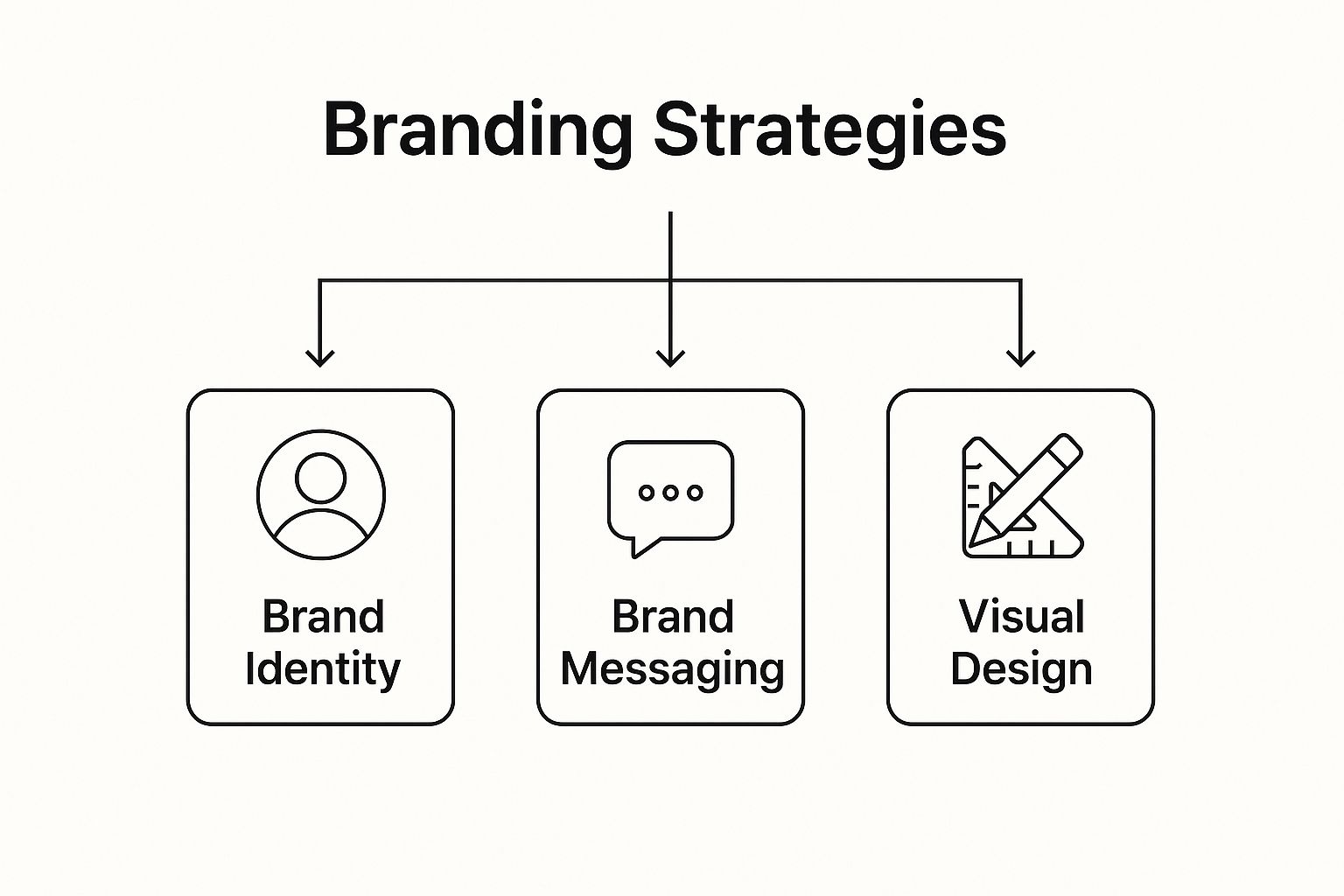Think of a marketing firm as your business's dedicated growth partner. They're staffed with specialists who know how to diagnose market challenges and cook up the right strategies to solve them. In short, they’re a strategic ally—like a specialist for your company's health—whose whole job is to connect you with the people who need what you sell.
What Exactly Is a Marketing Firm's Role?

It’s about way more than just running a few ads. A marketing firm’s real job is to take your big-picture business goals and turn them into tangible, measurable wins. They essentially become an extension of your own team, bringing the expertise and firepower needed to cut through the noise in a crowded market.
This whole process usually kicks off with a deep dive into where you stand today, sniffing out opportunities you might have missed. To really get what they bring to the table, it helps to understand what marketing agencies do on a day-to-day basis. From there, they build a complete roadmap designed to get your brand noticed and, most importantly, drive revenue.
A great marketing firm doesn’t just check off tasks on a list; it provides strategic direction. Their true value comes from creating a cohesive plan where every single move is intentional, measurable, and tied directly to your core business objectives.
The industry's growth alone tells you how vital this role has become. In the United States, there were 7,761 marketing agencies back in 2022, a number that's been climbing at a steady 12.0% annual rate since 2017.
Ultimately, their purpose is to provide the specialized knowledge you need to grow. If this sounds like a world you'd like to be part of, our guide on how to start a digital marketing agency walks you through building one from the ground up.
Crafting Your Blueprint for Success
Think of a top-tier marketing firm as the architect for your business growth. Before a single ad gets placed or a social media post goes live, they’re meticulously designing the blueprint. They don't just start building; they map out a detailed plan based on some serious digging and analysis. This strategic groundwork is what separates a focused, results-driven campaign from just a bunch of random marketing activities.
The whole thing kicks off with a deep dive. The firm will get into the nitty-gritty of market research to really understand the competitive scene, pinpointing gaps your rivals have totally missed and opportunities ripe for the taking. They won’t just guess who your customers are, either. They build out detailed customer personas, giving your ideal buyer a name, a backstory, and what makes them tick.
Defining the Path to Victory
Once that foundation is set, it’s all about setting clear, measurable goals. This is where Key Performance Indicators (KPIs) enter the picture. A good firm helps you move past fuzzy objectives like "more sales" and nail down specific targets that actually mean something, like:
- Boosting qualified leads from organic search by 20% within six months.
- Increasing customer lifetime value (CLV) by 15% over the next fiscal year.
- Cutting the customer acquisition cost (CAC) by 10% by optimizing ad spend.
This infographic breaks down a huge piece of that strategy—the branding.

As you can see, a solid brand strategy isn't just one thing. It’s about weaving together your identity, messaging, and visual design so they all sing from the same hymn sheet. Every little piece has to work together to create an experience your audience won't forget.
Here's a quick look at the core strategic functions a marketing firm will typically own.
Core Strategic Functions of a Marketing Firm
| Strategic Function | Description | Business Impact |
|---|---|---|
| Market & Competitor Analysis | Digging into market trends, audience behavior, and what the competition is up to. | Identifies untapped opportunities and protects against competitive threats. |
| Audience Segmentation | Dividing the target market into distinct groups based on demographics, behaviors, and needs. | Allows for highly personalized messaging that resonates and converts better. |
| Goal Setting & KPIs | Defining specific, measurable, achievable, relevant, and time-bound (SMART) objectives. | Creates clear benchmarks for success and ensures everyone is aligned. |
| Brand & Messaging Strategy | Crafting a unique brand identity, voice, and core messages that connect with the audience. | Builds brand recognition, trust, and loyalty among customers. |
| Channel & Budget Allocation | Deciding which marketing channels to use and how to distribute the budget for maximum ROI. | Optimizes spending to focus on the channels that deliver the best results. |
These functions form the bedrock of any successful marketing plan, ensuring every move is calculated and purposeful.
Strategy is about making deliberate choices. It ensures every dollar spent and every hour worked is a direct investment in your most important business objectives, turning your marketing from an expense into a powerful growth engine.
All of this planning usually gets wrangled into a central document. If you're curious what that looks like, you can check out this handy marketing brief template. It’s this kind of strategic foresight that makes the difference between a campaign that soars and one that just costs you money.
Building Your Brand and Telling Your Story

Once the strategic blueprint is in place, the real magic begins. This is where a marketing firm rolls up its sleeves and starts bringing your brand to life. It’s the creative heart of the operation, where all that data and research gets turned into a personality that actually connects with people.
We're talking about more than just a slick logo. It’s about crafting a memorable story that your audience wants to be part of.
This whole process is about shaping your brand voice, designing a compelling visual identity, and writing messages that hit home on an emotional level. The goal? Make your brand instantly recognizable, whether someone sees a social post, reads a blog, or watches a video.
Creating High-Impact Content
A huge part of this is content creation. Think of marketing firms as content machines, churning out all the assets needed to tell your story across different platforms. They get what works where, making sure the right message finds the right person in the right format.
This isn’t just about pumping out stuff, though. It's about being strategic.
What kind of content are we talking about? It can be anything, really:
- Engaging Blog Posts: Articles that solve your audience's problems and quietly position you as the expert.
- Compelling Video Content: Everything from quick, snappy clips for social media to deep-dive product demos.
- Visually Appealing Infographics: These break down complex ideas into graphics people actually want to share.
- Strategic Social Media Campaigns: Cohesive content that sparks conversation and builds a real community.
Your brand is the sum total of every single interaction someone has with your business. A good marketing firm makes sure each of those touchpoints is consistent, authentic, and memorable, turning casual browsers into loyal fans.
Ultimately, this creative work is what builds genuine connections. It’s how a firm helps you stop just selling a product and start building a brand that people know, like, and trust. Getting that foundation right is everything. For a deeper look, you can explore some great brand voice guidelines that show how it's done.
Executing Digital Marketing That Drives Results
Once the strategy is locked in and the brand story is compelling, it’s time to get down to business. This is the execution phase—the engine room where all those big ideas and plans meet the real world. The whole point is to grab your audience's attention and, ultimately, guide them toward becoming a customer.
Firms are masters at juggling a whole ecosystem of digital channels, and each one has a very specific job to do. They’re pros at building, launching, and fine-tuning campaigns that get your brand seen and bring in new leads. The sheer scale of this is mind-boggling; global ad spending is on track to hit $1.158 trillion by 2025, with mobile ads making up over $400 billion of that. You can dig into more of those numbers in this research by Bizplanr.ai.
But it’s not just about throwing money at ads. A multi-channel approach makes sure your brand shows up wherever your customers are hanging out online. It’s about being seen by the right people at the right time.
Core Digital Marketing Services
To pull this off, agencies deploy a whole range of specialized services that are designed to work together. While every company’s plan will look a little different, most rely on a core set of powerhouse tools to get traffic flowing and people engaged.
Here are the heavy hitters you’ll almost always find in their toolkit:
- Search Engine Optimization (SEO): Think of this as the long game. SEO is all about making your website more visible in organic search results. It builds a steady, sustainable stream of high-quality traffic without you having to pay for every single click.
- Pay-Per-Click (PPC) Advertising: Need results yesterday? PPC is your answer. It puts your ads right in front of potential customers on places like Google and social media, offering super-precise targeting and quick, easy-to-measure results.
- Social Media Management: This is so much more than just posting a few updates. It’s about building a real community, actually talking with your followers, and running campaigns that build brand loyalty and drive sales.
A digital strategy that truly works is an integrated one. SEO builds your foundational authority, PPC swoops in to capture immediate demand, and social media creates a loyal community around your brand. When they all work in concert, they create a marketing engine that's both powerful and resilient.
Connecting the Dots for a Seamless Journey
The real magic happens when an agency can weave all these different channels into one seamless customer experience. They make sure that someone who finds you through a Google search sees a consistent message in a retargeting ad on Instagram and then gets a relevant follow-up email.
This integrated approach is what turns casual interest into genuine action. By mastering these tools, a firm builds a system that meets customers at every single stage of their journey, from that first moment of awareness all the way to the final purchase. You can explore how to create this kind of unified approach by reading our guide on digital marketing best practices.
This is what a marketing firm does—they handle the technical execution that brings your strategy to life.
Measuring Performance with Analytics and Reporting

Let's be real: marketing without measurement is just a shot in the dark. It’s why one of the most vital things a marketing firm does is cut through the noise of data to prove their worth. They don’t just launch a campaign and cross their fingers—they track every single click, view, and conversion with a purpose.
Using a whole suite of powerful tools, these firms keep a close eye on performance, measuring everything against the Key Performance Indicators (KPIs) we talked about earlier. But it's not about dumping a spreadsheet full of numbers in your lap. The real magic is in translating that complex data into clear, actionable insights that help you make smarter decisions.
A great marketing firm’s reports should tell a story about your investment. It’s got to answer the big questions: What's actually working? What isn’t? And how do we get even better results next month?
This is a constant feedback loop, and it's absolutely essential. By digging into the performance data, firms can pivot their strategies on the fly, moving budget away from channels that are falling flat and doubling down on what’s really driving your growth.
Turning Data Into Decisions
A huge part of a firm's job is clearly defining how to measure marketing campaign success with solid analytics and reporting. Think about all the places customers find you online. With over 50% of adults now using social media to research products, just tracking likes and follows isn’t enough; you have to understand real engagement.
They also know how to squeeze every drop of value out of proven channels like email. For instance, just adding a video to an email can boost open rates by 16%, a simple change that can deliver a huge return.
This data-first approach makes sure every dollar you spend is working as hard as it can for your business. It’s about cutting out the wasteful spending and pushing your ROI as high as it can go.
A Few Common Questions About Marketing Firms
Stepping into the world of marketing partnerships can feel a little confusing. Getting straight answers is the best way to figure out if hiring a firm is the right call for your business and, just as importantly, what you should expect from the relationship.
Let’s tackle some of the most common questions business owners have when they’re thinking about bringing in some professional help.
How Much Does It Cost to Hire a Marketing Firm?
This is always the first question, and the honest-to-goodness answer is: it depends. The price tag on a marketing firm can swing wildly based on the scope of the work, the agency’s reputation, and how they structure their pricing.
You’ll usually run into a few common models:
- Monthly Retainers: Think of this like a subscription. You pay a fixed fee each month for ongoing work like SEO or social media management. This can range anywhere from $2,000 to $20,000+ a month.
- Project-Based Fees: This is a one-time cost for a specific, well-defined project. A website redesign or a full-on brand launch would fall into this category.
- Hourly Rates: Some firms charge by the hour for consulting or specialized tasks, which typically lands somewhere between $100 and $300.
The real key is to find a partner whose pricing feels right for your budget while delivering a return you can actually see.
What Is the Difference Between a Marketing Firm and an Ad Agency?
Good question. People often use these terms interchangeably, but there’s a real difference. An advertising agency has traditionally focused on one thing: creating and placing paid ads. We're talking TV commercials, radio spots, and those digital ad campaigns you see everywhere.
A marketing firm, on the other hand, plays a much broader, more strategic game. They get involved in everything from the initial market research and brand strategy all the way to content creation, SEO, and email marketing. They build the entire marketing engine; an ad agency is often focused on just one powerful part of it.
A marketing firm is the architect of your entire growth strategy, while an advertising agency is the specialized builder focused on constructing and placing your paid messages for maximum visibility.
How Do I Know If My Business Needs a Marketing Firm?
You’ll start to see the signs. It might be time to hire a firm if you’re noticing some specific growing pains. Maybe your business growth has hit a plateau, or you realize you just don’t have the specialized skills in-house to really compete anymore.
Another huge one? Your current team is simply stretched too thin to give marketing the focus it deserves. If you feel like you're just spinning your wheels and not seeing a clear return from your efforts, a firm can provide the strategic direction needed to get things moving again.
For a deeper dive, check out our guide on how to choose a creative agency that truly fits what you're looking for.
At Creativize, we connect you with the specialized local talent you need to execute your marketing vision. Find your next creative partner today!

